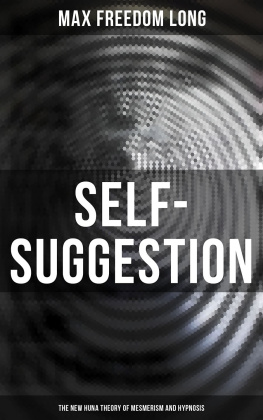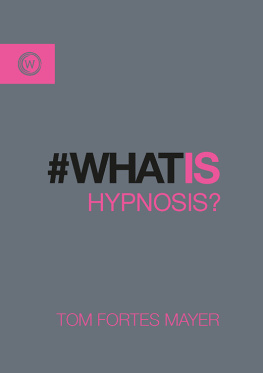This volume culminates a long historyof study and practice in psychology and hypnosis. Though many years have passedI cannot overlook the debt I owe to my late mentors Dr. Ernest R. Hilgard andDr. Martin T. Orne. Thanks go also to Dr. Ren Girard and the members of theGirard Group at Stanford University. Over the years many students andcolleagues helped and advised me in my research especially Lawrence D. Greene,Lauren Marra Passante, Dr. Jeffrey Rudski, and the late Dr. George Gordon. Iowe a special debt of gratitude to the Peninsula Library System of San MateoCounty, California and to the Trexler Library at Muhlenberg College. My son,Edgar-Award-winning author Dr. Mark Graham, and my daughter-in-law FauziaGraham, helped me in innumerable ways over the years to focus and improve mymanuscript, and my wife Michele forbore with good humor the ups and downs of mywriting persona. The following individuals kindly read the manuscript to offerfeedback and advice: John W. Carson, III; Cathy Newell-Jackson; Dr. PhilipSecor; Bettina Whaley; and Dr. Wojciech Zalewski.
Preface
There has always beentension between the rulers and the ruled, the masters and the masses. It is thecentrifugal pull of self-desire against the welfare of the larger society, thetether that holds human history together. For much of that history society atlarge was the concern of a governing class: kings or priests, who often viewedthe masses, scrabbling for survival, with disdain. As long as the masses weretied to the land and easily subjugated the system remained more or less stablethough far from just. Then, a few hundred years ago, things began to change.The invention of moveable type, mercantilism, the emergence of a middle class,and the beginnings of industrialism spawned political philosophies thatproclaimed the rights of ordinary men and women. In North America these changesgave birth to a new nation whose growing pains could simply be pushed westwarduntil they had to be resolved. In Europe they produced a bloodbath that sawaristocrats beheaded and left the bourgeoisie quaking. The question was couldthe power of the masses be controlled or was civilization to end in anarchy? Itis a question that remains open. The harsh truth is that human beings are anunstable amalgam of altruism bonded to a base of vicious selfishness. The base,what author Carl Sagan called the dragons of Eden, is what nature has givenall vertebrates to survive as individuals and as a species. The altruism,annealed over eons of evolution, enables us to overcome our animal nature andlive in caring social groups. The enormity and complexity of our current worldis proof that it has worked. The existence of atomic weapons and the palpabledanger that we will use them is proof that it has not.
Even in the allegedly egalitarian UnitedStates the wealthy and powerful never really trusted the masses. In the Constitutional Convention of 1781 Colonel GeorgeMason of Virginia said that giving the ordinary citizen the right to vote wouldbe like referring a trial of colors to a blind man. Similarly, George Washingtonproclaimed that mankind when they are left to themselves, are unfit for theirown government. The Constitution is a compromise that recognizes these views. Itallows each citizen the right to vote for President, for example, but eventoday reserves the final choice to the College of Electors. The electors,appointed by the state legislatures, are technically free tovote for anyone eligible to be President, even if that person was not on theballot. Occasionally a so-called faithless elector will do just that but in practice the electors vote for the candidates to whomthey are pledged on the basis of the popular vote.
Throughout the nineteenth century politicalphilosophers struggled to find a new formula that would allow altruism andanarchy to co-exist in an industrialized world. For Karl Marx the answer was toobviate selfishness by eliminating private property, in other words, todissolve individual rights into the well-being of the greater society. Thatsolution was anathema to wealthy and powerful interests in Western Europe andthe United States where a new understanding of the masses emerged based onpsychology rather than economics. A critical problem for those who championeddemocracy was the reality that common men and women sometimes transformed, likeDr. Jekyll becoming Mr. Hyde, into an unruly mob that committed heinous acts ofviolence. Examples readily at hand and in recent memory included the Reign ofTerror that occurred in France at the onset of the French Revolution(1793-1794) and the insurrection of the Paris Commune in 1871.
French social psychologist Gabriel Tardeanchored his explanation of social behavior in the concept of imitation. ForTarde the sons imitation of the father was the primal phenomenon that lies atthe root of social behavior, a phenomenon that was not based on force orcunning but upon prestige. Tarde compared it with hypnosis andhis theories directly influenced those of Sigmund Freud. Tardesviews were simplified and popularized by his younger contemporary Gustave LeBon who believed that one who became part of a crowd lost his or herindividuality to what Le Bon called the crowd soul which he believed wasintellectually inferior to the individual and inherently malignant. Le Bonviewed the crowds emergence as a kind of hypnotic regression to a prehistoricmental state of mankind. Le Bons theoriesof crowd psychology contributed to fascist theories of leadership, such asHitlers Mein Kampf, which emerged in the early twentieth century, butit is the writings of Tarde that are most relevant today because they relate tothe use of communications media to influence the masses. Le Bon focused on thedestructive proclivities of crowds which by nature exist in a particular place.Tarde, asserted, on the other hand, that the media were creating a vastlypowerful public that existed across geographical boundaries. Theimportance of the crowd, he said, was a thing of the past, because it wasincapable of extension beyond a limited area, whereas the public could extendindefinitely and its life became more intense as it extended. The question became how to shape and control it.
Answers emerged after World War I. The warresulted not only in terrible death and destruction but in politicalrevolutions that swept away the imperial houses of Austria-Hungary, Germany andRussia and, in the latter case, led to the creation of the Soviet Union. Therevolution did not spread westward, however, and to classical Marxists that wasa bit of a puzzler because Marx had predicted that the most industrializednations, such as Great Britain, would be the first to fall. Italian philosopherand Communist Party leader, Antonio Gramsci, explained why they had not.According to Gramsci the capitalist states had maintained their status becausethey had achieved what he called cultural hegemony, that is, they succeededin convincing the working classes, (the public) that upper class values werethe common sense values of everyone. In the United States that meant thatnotions of limited government and private property became everyones AmericanDream. The cast of the television show High School Musical 3 (2008)summed it up in the hit song Were All in this Together asserting that: allour dreams have no limitations. That is, of course, nonsense but attractivenonsense to teenagers who are the primary viewers of television.







